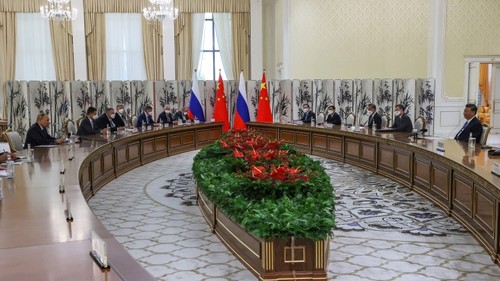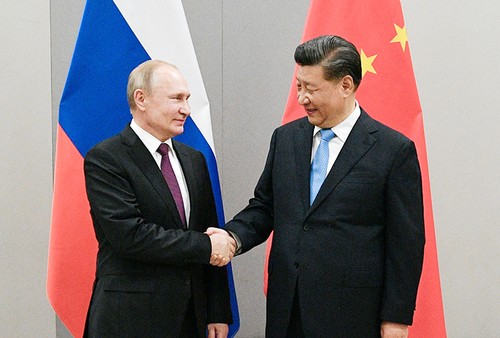 Russian President Vladimir Putin (left) and Chinese President Xi Jinping hold talks on the sidelines of the Shanghai Cooperation Organization (SCO) summit in Samarkand, Uzbekistan. Photo: AP Russian President Vladimir Putin (left) and Chinese President Xi Jinping hold talks on the sidelines of the Shanghai Cooperation Organization (SCO) summit in Samarkand, Uzbekistan. Photo: AP
|
This summit marks the first in-person discussion of SCO heads of state since the onset of the COVID-19 pandemic in 2020, the first trip abroad by President Xi Jinping since early 2020, and the first in-person meeting between the leaders of China and India since their border clash in 2020.
Russia and China affirm their alliance
Analysts say this is an opportunity for China to show its influence and for Russia to assert its pivot to Asia policy, at a time when Moscow and Beijing both have sour relations with the US. President Putin said he expected the talks to create momentum for the Russia-China strategic partnership, and President Xi said China is ready to join Russia in steering the world toward a more sustainable and positive development.
 The spotlight of SCO Summit in Samarkand is the meeting between the leaders of Russia and China. Photo: Reuters The spotlight of SCO Summit in Samarkand is the meeting between the leaders of Russia and China. Photo: Reuters
|
Experts say the two leaders are trying to prove many things. The Russia-China summit is extremely important amid tensions with the West. China has opted for a balanced approach in the Ukraine crisis. It has resolutely refused to criticize Russia's attack on Ukraine and has opposed Western sanctions against Russia.
Russia strongly supports China, whose tensions with the US spiked when US House Speaker Nancy Pelosi visited Taiwan (China) last month. For Putin, the SCO summit is an opportunity to show that Russia cannot be isolated. Russia is looking to find new markets for its products and new suppliers of items it can no longer import from Europe. Xi is taking this opportunity to cement his image ahead of China’s upcoming National Party Congress in October.
Although China and Russia have some areas of disagreement, both have a deepening recognition of their shared strategic goals, particularly blocking US influence in Asia.
SCO’s potential role
Founded in 2001, the SCO comprises Russia, China, India, Pakistan, Kazakhstan, Kyrgyzstan, Tajikistan, and Uzbekistan. Afghanistan, Belarus, Iran, and Mongolia participate as observers, and Armenia, Azerbaijan, Cambodia, Nepal, Sri Lanka, and Turkey are partners.
The SCO is emerging as a new center of power, accounting for 25% of the world's population and 60% of the total area of Asia and Europe. The SCO is receiving more applicants to join as full members, observers or dialogue partners. At this summit, Iran has signed a memorandum of understanding on SCO membership.
Strengthening cooperation can help China and Russia address political, economic, and security challenges, and other SCO members can benefit from their expanding influence in economics and world politics.